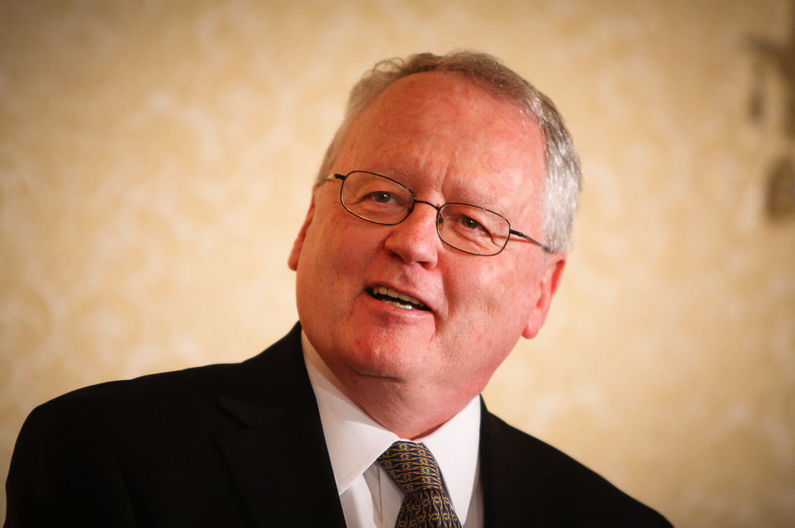Today marks the beginning of a new era at Suffolk as the university’s ninth president, James McCarthy, takes office.
“I have the utmost confidence in McCarthy,” said Provost Barry Brown. “He is a person who will build on our progress because of his understanding of urban universities.”
McCarthy had already begun working remotely from New York, where he spent his final days as Provost at Baruch College.
“I have been on the phone, on email non-stop since the appointment was made,” on January 18, said McCarthy, who was managing two Blackberries—one for Suffolk and one for Baruch—when he spoke with The Journal on Friday in a phone interview.
He read up extensively on Suffolk and began setting up meetings with student groups, faculty, deans, and vice presidents for his first days in office, all while tending to his responsibilities at Baruch.
It was “like having a duel personality almost,” said McCarthy, who had to “switch from one job to another on short notice. It’s been a juggling act. I’ve been spending a lot of time with the interim provost [to help] make sure he’s as up to speed as he can be for when he starts next week.”
McCarthy has also spent a lot of time talking to Brown, the man who for the past 15 months has led the university in the wake of David Sargent’s retirement.
The two have spoken “regularly, almost on a daily basis, reviewing reports and materials,” said Brown. “[I’m trying to] give him a sense of where we are. He has been eager to be immersed in everything that’s occurred in the last year-and-a-half.”
Brown, who became Suffolk’s provost in 2008, took on the role of acting president when Sargent retired in October 2010, so he is also familiar with having duel job responsibilities.
“The president is the chief executive officer of the university,” he said. “[The president] articulates the direction of the university, helps it flourish, connects with alumni, the outside world, the press. [The president is] the voice of the university internally and externally.”
The role of provost is more of an internal one, dealing with budgets, managing the rest of the senior staff and making sure faculty have the resources they need.
“The most rewarding aspect [of being acting president] was to increase dialogue between faculty members in the different schools,” said Brown.
“[We’ve] become more open, more communicative, more honest with each other. I couldn’t really undertake the process until I assumed the role of acting president,” creating “wonderful momentum for Jim McCarthy,” he said.
But Brown is eager to return to the sole role of provost. “It’s a big university and having one person manage all that is not an easy process.”
One of the biggest challenges for Brown came when the university laid off 20 employees in September in an effort to cut costs.
It was “very difficult for me personally and the university in general,” he said. “[This] period of recession has been a struggle for students and their families. I lie awake at night,” thinking about the difficult decisions he has had to make and how to make sure Suffolk performs at its best.
Before that, Brown worked on “maintaining the stability of the university after the resignation of Sargent.”
Sargent’s resignation followed a period of controversy and negative press for the school concerning his salary. Brown would not comment specifically on the issue, saying it was “between the president and the board of trustees,” who negotiate the president’s salary.
“My job was to make sure the university was running smoothly,” he said, instead offering kind words for Sargent, who served as president for more than 20 years and the university for more than 50 years.
“David Sargent was a remarkable leader who caused the university to grow its population of students and its physical footprint. You need a David Sargent before you can go to the stage that we’re in now.”
McCarthy’s salary will be “well within the range of what’s appropriate,” said Board of Trustees Chairman Andrew Meyer, who could not disclose the specific amount because it is a private contract.
His salary will be released this spring as part of a tax form that all non-profit organizations have to fill out, said Meyer.
McCarthy acknowledged that he will probably need to address some sort of controversial issue at some point.
“I think that something will arise, no question about that. I hope to be here a long time, so something will arise,” he said. “When something comes up, it’s very important to address it thoughtfully and as quickly as possible. I don’t shy away from difficult issues.”
For now, McCarthy will have to spend his time getting acquainted with Suffolk—the students, faculty and staff, the buildings, and a pile of paperwork waiting on his desk.
He is already planning to attend an event tomorrow kicking off Black History Month and has planned a town hall meeting for the Suffolk community on Tuesday at 1 p.m. in the C. Walsh Theatre.
The meeting could be rescheduled if a possible Patriots parade conflicted with it, though plans are to move forward with the meeting as of now, said Interim Vice President of Marketing and Communication Greg Gatlin.
Brown said that McCarthy has arrived at the perfect time to lead the university’s next chapter. “I and other administrative folks will be there to support him so he can develop his sense of where to go in the future.”



















